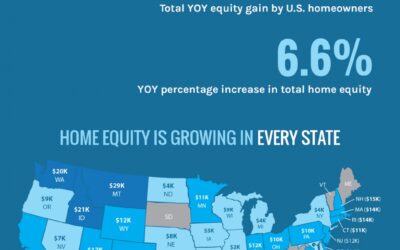There’s More to a Bubble Than Rising Home Prices

What truly causes a housing bubble and the inevitable crash? For the best explanation, let’s go to a person who correctly called the last housing bubble – a year before it happened.
“A bubble requires both overvaluation based on fundamentals and speculation. It is natural to focus on an asset’s fundamental value, but the real key for detecting a bubble is speculation…Speculation tends to chase appreciating assets, and then speculation begets more speculation, until finally, for some reason that will become obvious to all in hindsight, the ‘bubble’ bursts.
I have taken to calling the housing market a ‘bubble’.”
– Bill McBride of Calculated Risk calling the bubble back in April 2005
Where do we stand today regarding speculation?
There are two measurements that are used to determine the speculation in a housing market:
1. The number of homes purchased by an investor and
2. The number of homes being flipped (resold within a twelve-month period)
As compared to 2005, investor purchases are down dramatically (from 23% to 13%) and so is flipping (from 8.2% to 5.7%). McBride explains:
“There is currently some flipping activity, but this is more the normal type of flipping (buy, improve and then sell). Back in 2005, people were just buying homes and letting them sit vacant – and then selling without significant improvements. Classic speculation.”
What are the experts saying about speculation in today’s market?
DSNews recently ran an article which asked two economists to compare the speculation in today’s market to that in 2005-2007. Here is what they said:
Dr. Eddie Seiler, Chief Housing Economist at Summit Consulting:
“The speculative ‘flipping mania’ of 2006 is absent from most metro areas.”
Tian Liu, Chief Economist of Genworth Mortgage Insurance:
“The nature of housing demand is different as well, with more potential homeowners and far fewer speculators in the housing market compared to the 2005-2007 period.”
And what does McBride, who called the last housing bubble, think about today’s real estate market?
Sixty days ago, he explained:
“In 2005, people were just buying homes and letting them sit vacant – and then selling without significant improvements. Classic speculation. And even more dangerous during the bubble was the excessive use of leverage (all those poor-quality loans). Currently lending standards are decent, and loan quality is excellent…
I wouldn’t call house prices a bubble – and I don’t expect house prices to decline nationally like during the bust.”
Bottom Line
Speculation is a major element of the housing bubble formula. Right now, there are not elevated percentages of investors and house flippers. Therefore, there is not an elevated rate of speculation.
To view original article, please visit Keeping Current Matters.
Do You Need to Know More about Forbearance and Mortgage Relief Options?
Know your options! Call your mortgage provider.
The #1 Reason Not to Wait to List Your House for Sale
Let’s connect today to get your house on the market at this optimal time to sell.
Do You Have Enough Money Saved for a Down Payment?
Be careful not to let big myths keep you and your family out of the housing market. Let’s connect to discuss your options today.
6 Reasons You’ll Win by Selling with a Real Estate Agent This Fall
There are many benefits to working with a real estate professional when selling your house. Find out why.
Should You Buy a Retirement Home Sooner Rather than Later?
If you’re a retiree with a single-family home and want to move closer to your family, now is the time to put your house on the market.
A Homeowner’s Net Worth Is 40x Greater Than a Renter’s
The housing market has made a full recovery, and all-time low interest rates are giving home buyers a big boost in purchasing power.
Is it Time to Move into a Single-Story Home?
Single-story homes have a lot of benefits and are often in higher demand. This bodes well for future resale opportunities.
Why Pricing Your House Right Is Essential
When it comes to pricing your home, the goal is to increase visibility and drive more buyers your way.
Rising Home Equity Can Power Your Next Move
Over the past year, the average homeowner gained $9,800 in equity, growing their overall net worth.
Buyers Are Finding More Space in the Luxury Home Market
Home offices, multi-purpose rooms, gyms, and theaters are becoming more popular.









